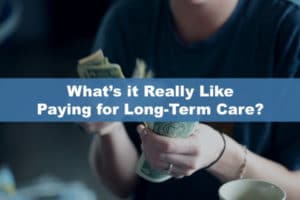What’s it Really Like Paying for Long-Term Care

Annual cost range is $18,720 for adult day-care services to $100,375 for a private room in a nursing home!
As written by Michelle Singletary and published in the Washington Post on November 26, 2018
One of my favorite Spock quotes from the Star Trek television series is, “Live long and prosper.” Who doesn’t want a long life, right?
But what if the longevity means spending down your money for long-term care? And that’s if you’ve been prosperous and have the funds to pay a facility or home health aide to care for you.
Genworth Financial recently released its 2018 Annual Cost of Care survey and found that the annual median cost of care now ranges from $18,720 for adult day-care services to $100,375 for a private room in a nursing home.
I asked readers to share their long-term care experiences, and here’s what they had to say:
“My mother had Alzheimer’s and was in a memory unit for two years,” wrote Chris Gonzales from California. “My dad has been in assisted living for two and half years and for the last two years has needed round-the-clock care. The cost, when my mother was alive, totaled $230,000 a year. The cost to care for dad is now $170,000 a year. This is in Fort Smith, Ark. My brother and I are very lucky that our parents lived below their means, saved, and did extremely well investing their money in the market, so money has not been an issue. We are also grateful for the ladies that watch over our father and consider ourselves extremely lucky to have people we can depend on as we both live out of state.”
“I managed the care of my mother (who had Alzheimer’s disease) from 1998 through 2006,” wrote Debbie Trice of Sarasota, Fla. “Even that long ago, the cost of her care approached $100,000 annually once she had to move from an assisted-living facility to a skilled nursing facility. The actual cost of long-term care goes way beyond the monthly or daily facility charges. Personal expenses (e.g., adult diapers, toiletries, laundry, haircuts) can be significant. I saved some money by purchasing diapers from a wholesaler and toiletries from a discount store and doing mother’s laundry myself. Medications cost more for residents in long-term care, too. Some states require that all medication, including over-the-counter items like aspirin and vitamins, be specially packaged by a pharmacist in blister packs — at extra cost, of course. Staffing is a critical issue. To keep their rates competitive, many facilities limit their staffing levels to the minimum required by law. But then some patients’ needs can’t be adequately addressed. I found it necessary to hire private duty aides to supplement facility staff for a few hours each day.”
Lane Beckham of New Jersey wrote, “Four years ago my wife (then 71) suffered a fall which led to numerous complications over the next year. She has since been bedridden going from a home hospital bed to a wheelchair. She can feed herself, converse, watch television and read catalogues, but that’s about it. We’ve had a 24/7 home health care aide since April 2015 at a current cost of $215 a day or $78,475 a year. A long-term care policy kicks in $100 a day but only for 5 years of benefit days.”
“My mother died two years ago and for the last two years of her life, she had progressively worsening dementia,”
One reader wrote. “We (mainly my sister) arranged for her to be cared for at her home. The cost was running at about $85,000 a year and that was two years ago! Why? At times, she was simply too much for one person to handle, so we often needed two people to stay with her. And while we went with the better-rated agencies, we still had problems with sitters stealing, using drugs, having friends over and even taking my mother out when they needed to run errands. What a nightmare.”
David Treece, an investment adviser and financial planner based in Miami Shores, Fla., has a client with Alzheimer’s who has a Genworth long-term care insurance policy, which so far has paid out about $323,000.
“I have learned nothing will ruin a retirement plan faster than long-term care expenses,” Treece wrote. “Try having to come up with nearly a third of a million dollars like my client if you don’t have coverage. It’s just unimaginable for most people. My biggest concerns for my clients are a group I call ‘the alones.’ These are people who have no spouse, no children, no close siblings and really nobody else. They can’t even name a beneficiary let alone someone to serve as a power of attorney or health-care surrogate. This group seems to be increasing as so many people never had children, are divorced or never married, or are estranged from family. Who is even going to help them? Our society isn’t really set up for this, and I don’t see any easy solutions.”
*****
How comfortable do you feel paying for care out of pocket when your health changes?
- Have you thought that Long-Term Care insurance would not be needed?
- Do you plan on spending down to Medicaid, a welfare program and then search for a place that will accept it – and you?
